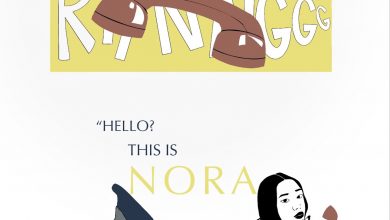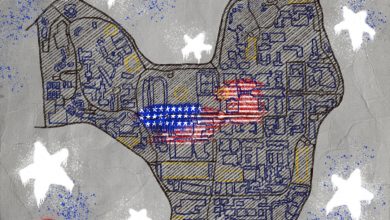Breaking Down “Breaking Dawn”
I don’t think I’ve ever felt more nauseated. It could, I admit, be because I have eaten pie for breakfast every day since Thanksgiving, but the more likely explanation is that I just saw “Twilight: Breaking Dawn.”
*SPOILER ALERT*
I have always had a love/hate relationship with “Twilight” (love Jacob, hate everything else). This installment of the saga is big news, because it has the long-awaited sex scene between Bella (played by Kristen Stewart) and Edward (played by Robert Pattinson), as well as a fiendish demon baby trying to devour Bella from the inside.
The Sex Scene: This sex scene has been long-awaited by every pubescent girl and middle-aged woman who wanted to lay Edward’s quivering, pale body down and watch him glitter, as well as whatever men are attracted to someone with all the personality of a stick. On their honeymoon, they plan to make like all married couples, and get down to business. Unfortunately, Bella is still human, and human-vampire sex is apparently very dangerous.
During the brief and “artful” scene, Bella has to tell him again and again that “it’s okay,” reassuring him that despite being in pain, she wants to keep going. The intensity leads him to shatter the wall behind them.
She awakes alone in bed the next morning, and as the camera pans out on her way to the mirror, we see the room is a wreck. Any part of her body she examines in the mirror is covered in bruises. Edward knows how badly he hurt her, and he refuses to have sex with her again (until she has a strong enough vamp-gina). She won’t take no for an answer, and continues to try to persuade him.
This is deeply disturbing on two levels. First, no means no, no matter who is saying it. This may sound odd, but Edward should not be forced to have sex if it made him uncomfortable. Unwanted sex is assault, no matter the gender of the victim. Second, this sequence essentially portrays a victim of violent assault literally begging to be victimized again.
Why doesn’t he just make her a vampire? Problem solved. Then she’d at least stand a chance of making it through the night.
The Baby: They tricked me, here. When Bella first found out she was pregnant, Edward, fearing for her safety, promises “Carlisle will get that thing out.” I was surprised: pro-choice, from a movie that so deeply valorizes waiting until marriage to have sex? In our next view of Bella, though, she is anorexic-skinny, with a pregnant belly. The contrast is startling, and deeply disturbing. Bella, it transpires, has decided to keep the baby. This fetus begins eating Bella from the inside: she loses any weight she had to begin with, she becomes even more pale and wan, and she can hardly move without assistance.
No one in this movie is pro-choice: the Cullens are completely pro-abortion, and Bella won’t even consider an abortion. Everyone else is pushing for her to abort the fetus, but she is determined to have it, even though she knows doing so will probably kill her. The movie itself is not pro-choice, because the baby took precedence over everything: over her love, her husband, and her own life. Bella was not pro-choice, because from the moment of conception, she considered the fetus a being. Although others thought she had an obvious decision, in my opinion, she gave herself no choice.
A woman having to choose between her own life and her baby’s life is one of the most difficult decisions a woman could ever have to make. I completely respect whatever choice women make in these circumstances, I only object to its portrayal within the context of “Twilight.”
“Breaking Dawn” has a lot of images that are specifically disturbing to women: violent sex, anorexia, unexpected pregnancy, bloody and painful birth, and death during childbirth.
These are issues that are particular to women, and society defines them as “personal” and “private.” Consequently, issues addressed in Twilight, particularly anorexia, violent sex, and unexpected pregnancy, are underdiscussed elsewhere. Our government policies reflect the categorization of these as women’s issues, because there is minimal study on eating disorders, victims of sexual assault are forced to defend themselves in court, and many states are passing laws that take agency away from women with unwanted pregnancies.
I am grateful that “Twilight” addressed these issues, but I do not think it took a pro-woman stance.
I’d like to say I’m reserving judgment until I see the next movie, and that I believe that becoming a vampire will make Bella the strong character she always had the potential to be. In the end, though, I believe that whether human or vampire, Bella will continue to rely on Edward and Jacob to be her heroes, saviors, and protectors. She will never be the strong feminist icon I would love to see out of a vampire flick.





“This sex scene has been long-awaited by every pubescent girl and middle-aged woman who wanted to lay Edward’s quivering, pale body down and watch him glitter, as well as whatever men are attracted to someone with all the personality of a stick. On their honeymoon, they plan to make like all married couples, and get down to business. Unfortunately, Bella is still human, and human-vampire sex is apparently very dangerous.”
Hilarious!
I really enjoyed this piece; it made me chuckle a few times. Twilight, however, is a serious pop culture problem for feminists(women) everywhere because of its ubiquity. Thanks for bringing it up.
Nora, I actually disagree with you that Bella is not pro-choice. Why is it not her choice to consider the fetus a being? I think that in and of itself is a choice and her decision to make. If she wants to consider the fetus a being, isn’t that her right and shouldn’t we respect that?
my only comment is that you shouldn’t call bella ‘anorexic skinny’. i really enjoyed your blog post but using these words to describe women can be sensitive, even if she is quite thin.